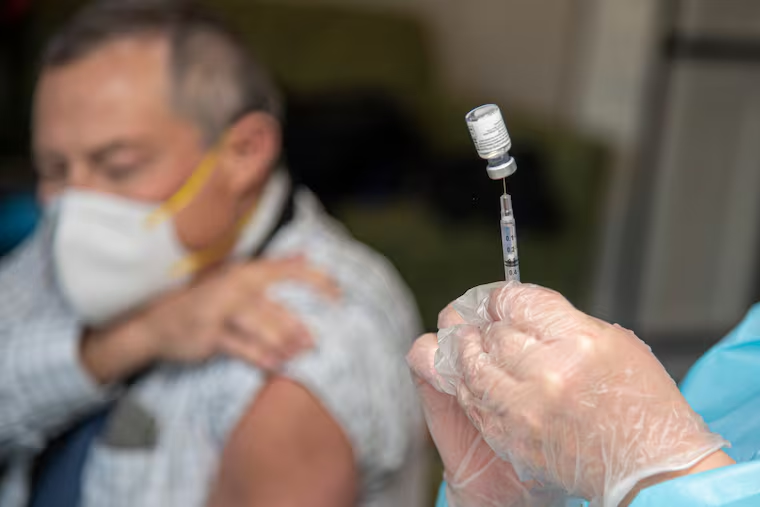In N.J.’s long-term care facilities, only half of staff have gotten vaccinated. Pa. doesn’t have the numbers.
The exasperation with the state continued as the federal government released revised nursing home guidance allowing indoor visits.

Only about 50% of New Jersey’s long-term care facility staff have been fully vaccinated as officials there work to address “some vaccine hesitancy.” Meanwhile, in Pennsylvania, the Department of Health says it is still working to gather that data, though officials have said vaccine hesitancy among staff is a concern.
The lack of information has left Pennsylvania’s senior advocates frustrated as they hear that the majority of care-home residents have been fully vaccinated yet worry about staff members who have not been vaccinated bringing the virus back into these facilities.
“We’ve been asking these questions for so long — first about cases and deaths, now about vaccines,” said Diane Menio, executive director of the Center for Advocacy for the Rights & Interests of the Elderly (CARIE). “We’re just not getting” answers.
The exasperation with the state continued this week as the federal government released revised nursing home guidance allowing indoor visits, regardless of whether the resident or their guests have been vaccinated, and permitting inoculated residents to hug loved ones. Outdoor visits are still preferred, the guidance notes, but the relaxation of other restrictions was attributed to the steep decline in cases and deaths in these facilities since vaccinations began.
» READ MORE: Nursing home group cites evidence COVID-19 vaccine is already working for their residents
After being devastated by the pandemic (more than a third of the country’s virus-related deaths, the New York Times reports, have been linked to nursing homes), residents and staff were among the first people eligible to be vaccinated. In recent months, nearly five million residents and staff nationwide have gotten at least one shot, according to the Centers for Disease Control and Prevention. That number includes more than 237,000 people in Pennsylvania, according to the CDC data, and more than 147,000 people in New Jersey.
Pennsylvania officials said Friday the only metric they have regarding vaccine hesitancy is that of nursing home residents: 82% of whom have been vaccinated.
Across the country, officials have reported vaccine hesitancy inside facilities, particularly among staff, with a Walgreens executive saying last month that about 60% of employees were declining shots, which are provided by Walgreens and CVS through a federal partnership that sends strike teams into homes. Some of it, too, may be due to outside factors, such as the scheduling of clinics and mistrust of vaccines among people of color.
The Inquirer has asked Pennsylvania officials about vaccine hesitancy in nursing homes throughout the rollout, including this week, and has yet to receive complete data. On Friday night, a Department of Health spokesperson said in an email that both “the Department of Health and Human Services are working on developing a data collection mechanism for this [staff vaccine administration] statistic that we hope to have soon.”
In New Jersey, long-term care centers reported earlier this week that about 72% of residents were fully vaccinated, as were about 90% of assisted-living residents, Health Commissioner Judith Persichilli said. Both places reported, however, that only half of their staff have been fully vaccinated, which Gov. Phil Murphy called “unacceptable.”
“That number’s got to change,” he said. “The good news is when you have residents getting vaccinated at the levels they’re getting vaccinated, you’re seeing the outbreak numbers come down. But it’s not foolproof.”
The state has targeted staff members through social media, Persichilli said, and developed a toolkit for facility administrators that includes answers to frequently asked vaccine questions.
”We know there has been some vaccine hesitancy among long-term staff,” she added.
New Jersey’s revelation that half of care facility staff had not been vaccinated came weeks after state officials again began allowing indoor visits in some nursing homes. Such visits were prohibited on and off throughout 2020, and last month Persichilli said that the loosening of restrictions was possible because outbreaks in these homes were declining.
Meanwhile, Pennsylvania officials said Friday they were “strongly encouraging” all long-term care facilities to immediately implement the new federal guidance allowing indoor visits.
As they advocate for residents’ safety, Menio said she and her colleagues would like not only to see the commonwealth’s data regarding facility vaccination rates, but also to learn more about the reasons why employees aren’t getting shots.
» READ MORE: Pa. seniors are ‘at their wit’s ends’ trying to get coronavirus vaccines
“If they’re refusing because of hesitancy, obviously there’s a need for more training,” Menio said. “If it’s because they’re being missed, they need to find a way to catch them.”
Hesitancy is “certainly an issue,” she said, but there could be other factors at play. Some employees work nights, she said, and may not have the flexibility to return to work for daytime clinics as they juggle taking care of their children, getting sleep between shifts, and perhaps even working a second job.
And “some staff are saying they want to wait and see,” Menio said. “Hopefully what they see is something good,” as more of their friends, relatives, and neighbors, as well as the residents they care for, get vaccinated.